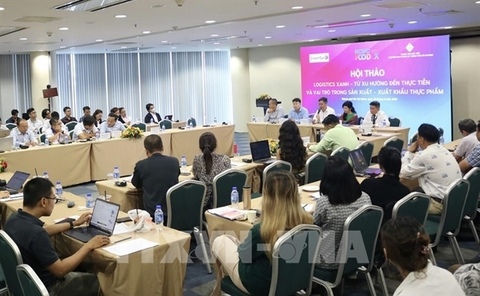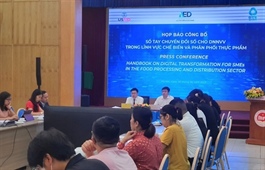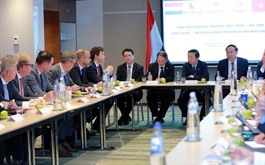Green logistics remains challenging for Viet Nam
Green logistics remains challenging for Viet Nam
Though green logistics is currently a global trend and will become a requirement of the international food industry supply chain, Viet Nam currently faces many challenges to meet the standard, experts said.

View of the conference. Green logistics is currently an important link to make the green supply chain, towards a sustainable development roadmap. — VNA/VNS Photo |
At the conference on green logistics in the food production and export industry held by the HCM City Investment and Trade Promotion Centre (ITPC) this week, Nguyen Tuan, deputy director of ITPC, said the trend of green trade and logistics is gradually becoming an indispensable requirement to create higher standards, which means more costs for trade and logistics activities.
According to Tuan, green logistics is currently an important link to make the green supply chain, towards a sustainable development roadmap. In the context that consumers increasingly prefer environmentally friendly products and the trend of transition to a green economy is taking place globally, green logistics is also increasingly interested and invested in a professional manner by firms.
For the food industry in Viet Nam, green logistics plays an important role in ensuring the efficient and sustainable transportation of food products, while minimising negative impacts on the environment.
The greening of the logistics industry and application of green logistics solutions in business in many fields, such as green transportation, green packaging, green warehousing and green logistics data management, will help firms meet environmental criteria, improve competitiveness and gain sustainable growth.
However, international logistics consultant Ton That Tu said there are currently many challenges to developing green logistics in Viet Nam. Specifically, road transport accounts for a high proportion of up to 74.4 per cent of the total transport volume, while the trend of shifting to other means of transport such as railways and waterways is not clear.
Besides, Tu said, most enterprises in the logistics industry in the country are small- and medium-sized and operate independently, which causes them to lack coordination and standardisation in logistics services.
Many logistics service providers in Viet Nam lack the technological capabilities and expertise that are required to provide high quality logistics services. Their poor inventory management and slow delivery also cause low efficiency and increased costs.
Although Viet Nam has invested significantly in infrastructure development, there are still areas where infrastructure is inadequate or needs improvement, Tu said.
According to Tu, for the food industry, green logistics can help improve food safety and quality, which is especially important in Viet Nam where food safety remains a major concern for both consumers and producers.
Moreover, green logistics can help reduce transportation costs and increase efficiency in the supply chain by optimising delivery routes and reducing the number of empty or half-loaded trucks on the road, which can help firms save fuel and transportation costs besides reducing traffic congestion and pollution.
Experts said in order to improve the logistics industry in Viet Nam, it is necessary to have policies to invest in infrastructure of roads, railways, airports and ports to facilitate the transportation of goods across the country.
Relevant ministries and sectors need to simplify regulations and reduce administrative procedures that create barriers for freight service providers. They should encourage freight service providers to innovate, adopt more environmentally friendly modes of transport, such as using electric vehicles or reducing packaging waste, which will help promote sustainable logistics practices and reduce the industry's impact on the environment.
For logistics and food firms, it is necessary to actively digitalise, apply new technologies such as warehouse automation, transportation management systems and electronic data interchange (EDI) to improve efficiency and accuracy of freight operations as well as supply chains while still optimising costs.





















